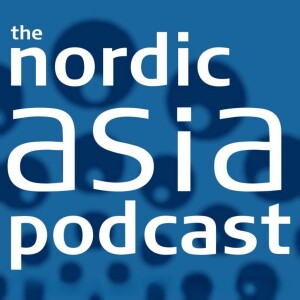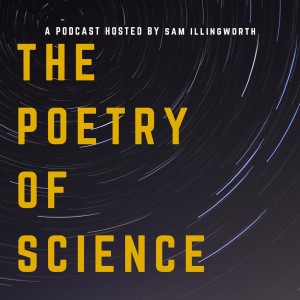

The Nordic Asia Podcast
https://feeds.megaphone.fm/NBN3426069376Episode List

Rivals in a Tight Embrace Russia, China, and the Central Asian Chessboard
This podcast episode by Alevtina Solovyeva traces Central Asia as the enduring crossroads “between empires,” where caravan routes outlast the borders drawn over them. It opens with the Silk Roads: trade as the region’s original superpower – moving goods, ideas, and identities. The narrative then tracks how Qing–Russian rivalry and the 19th century “Great Game” layered governors, railways, and taxes onto steppe and peoples, then the Soviet period engineered republics, industries, and pipelines while China watched, split, and later recalibrated. Independence for the five Central Asian states after 1991 reset the board: Russia remained the familiar security habit; China re-entered with capital and corridors, culminating in the Belt and Road. Multi-vector tendencies took hold as Turkey, Iran, Japan, Korea, the U.S., and the EU pressed in. The 2022, start of the full-scale war in Ukraine, accelerated internal and external processes concerning Central Asia as a strategic area, as well as a Russia-China partner-rivalry across energy, transport, finance, and soft power. Four platforms – SCO, EAEU, BRICS, and BRI – showcase both cooperation and competition, with BRI as the physical layer that forces choices on routes, rules, and control. Looking to 2025-2030, three stress tests loom: the terms of Power of Siberia-2, corridor races (CKU vs. Kazakh/Middle Corridor routes), and “security creep.” Central Asia has become a focal arena for international actors amid deep shifts in power balances and rules. It is a fast-moving environment with open-ended trajectories, multiple internal and external agents and situational theatres where interests intersect. Dr. Alevtina Solovyeva is the Head of the Centre for Oriental Studies and Mongolian Research Laboratory at the University of Tartu. She specializes in Asian studies, Chinese and Mongolian studies, folklore studies, historical and social anthropology, and social sciences.

Gen Z Uprising: Youth, Protest and Political Change in Nepal
In early September 2025, Nepal witnessed an extraordinary week of upheaval that many now refer to as the ‘five-day revolution’. Within the span of a single week, youth-led ‘Gen Z’ protests spread across Kathmandu and other major cities, the prime minister and his government resigned, the army intervened, parliament was dissolved, and Nepal’s new (and first female) interim prime minister was sworn in. The events revealed deep frustrations among young Nepalis with corruption, socioeconomic exclusion, and a lack of political accountability. In this episode of the Nordic Asia Podcast, Dr. Jeevan Baniya joins host Hanna Geschewski to explore the deeper forces behind this moment. They discuss the grievances that brought young Nepalis to the streets, why these long-standing frustrations erupted now, and how the ‘Gen Z’ protests should be understood in relation to questions of representation and political change. The conversation also considers the diversity within Nepal’s youth movement and the pathways through which young people may shape politics in the aftermath of the uprising. Jeevan Baniya is a political scientist and Deputy Director of the research institute Social Science Baha in Kathmandu, Nepal. Hanna Geschewski is a PhD researcher in Human Geography at the Chr. Michelsen Institute and the University of Bergen in Norway. Her work focuses on migration, displacement and socio-environmental change in the Himalayan region and South Asia.

Localisation of Islamic Arts in Malaysia
The Malay world boasts a wealth of diverse cultures. The arrival of Islam in the Malay world during the 12th to 13th centuries permanently transformed the aesthetic landscape, and even European colonisation could not stem this change. In this episode of the Nordic Asia Podcast, Prof. Julie Yu-Wen Chen from the University of Helsinki talks to Dr. Dzul Afiq bin Zakaria and Dr. Wahyuni Masyidah Binti Md Isa from the Faculty of Creative Arts, University of Malaya about the localisation of Islamic arts in Malaysia. They illuminate the core of Islamic arts, which view art as a reflection of their faith. In Islam, there is no fundamental distinction between spiritual and secular art, enabling the qualities of Islamic architecture and arts to rise above mere aesthetics and utility. Dr. Dzul Afiq bin Zakaria, a distinguished scholar and artist, possesses artwork that can be shared with our audience to elucidate the relationship between culture, philosophy, and the arts within the Malay world. Dr. Wahyuni Masyidah Binti Md Isa’s research employs Motion Capture technology to chart and conserve Islamic art. For example, Senaman Melayu Tua is a therapeutic exercise rooted in Malay culture. This exercise harmoniously integrates with both Malay culture and Islam, yielding comprehensive positive effects on the spiritual aspect by fostering inner peace, patience, and self-awareness. Her research utilises technology to visualize the micro-lines embedded within Senaman Melayu Tua. Julie Yu-Wen Chen is Professor of Chinese Studies and Asian studies coordinator at the Department of Cultures at the University of Helsinki (Finland). Chen is one of the Editors of the highly-ranked Journal of Chinese Political Science. Formerly, she was Editor-in-Chief of Asian Ethnicity.

Chile’s Growing Interests in China
Chile holds the distinction of being the first South American nation to forge diplomatic ties with the People's Republic of China, as well as the first in Latin America to enter into a free trade agreement with China. Despite the nearly 24-hour journey required to travel between the two countries, this considerable distance has not hindered the expanding interactions between them. The presence of various waves of the Chinese diaspora in Chile, while often overlooked, is a real aspect of the country's demographic landscape. In this episode of the Nordic Asia Podcast, Maria Montt Strabucchi, an Associate Professor at the Institute of History at the Pontificia Universidad Católica de Chile (Pontifical Catholic University of Chile) and Vice President for International Affairs at the same University, discusses the deepening connections between Chile and China and their implications for the development of China-related studies and education within Chile. Maria Montt Strabucchi served as the alternate director of the “Millennium Nucleus Impacts of China in Latin America (ICLAC)” project, which is supported by the Chilean National Agency for Research and Development. This initiative provides free online courses in Spanish aimed at enhancing understanding of China and has also developed online investment maps to illustrate China's influence in Chile. Her research interests encompass the portrayal of "China" and "Chineseness," as well as the dynamics of Chinese-Latin American relations, particularly in the context of Chile. Her 2023 publication, “Representation of China in Latin American Literature (1987-2016)” (Liverpool University Press), is available as an open-access resource. Julie Yu-Wen Chen is Professor of Chinese Studies at the Department of Cultures at the University of Helsinki (Finland). Since 2023, she has been involved in the EUVIP: The EU in the Volatile Indo-Pacific Region, a project funded by the European Union’s Horizon Europe coordination and support action 10107906 (HORIZON-WIDERA-2021-ACCESS-03).

Iban Heritage and Culture in Malaysia
Every June, there is a significant cultural event in Malaysia, which is called the Gawai Dayak Festival, highly celebrated to mark the end of the harvest season and give thanks to the Iban agricultural God, Raja Simpulang Gana. In this episode of the Nordic Asia Podcast, Prof. Julie Yu-Wen Chen from the University of Helsinki talks to Dr. Gregory anak Kiyai, an expert of indigenous ethnic heritage from the Faculty of Creative Arts, University of Malaya, about the Iban indigenous people in Malaysia and the meaning of Gawai Dayak for them. In the photograph of this episode, listeners can see an image taken by Dr Gregory anak Kiyai during fieldwork with the Iban community in 2019. There is a group of Lemambang, revered ritual specialists and custodians of Iban customary law, seen here gathered in a longhouse setting. Typically, elderly Iban men, or Lemambang, are deeply knowledgeable in traditional Iban customs and serve as important cultural figures. They are often consulted for their wisdom and lead significant ceremonies and rituals in the longhouse, especially during Gawai Dayak. On the Nordic Asia Podcast website, Dr Gregory anak Kiyai provides an image of the Lemambang, dressed in traditional Iban ceremonial attire known as baju burung (Iban woven jacket), woven using kebat or sungkit techniques. These garments bear sacred motifs inherited from their ancestors. Their headdresses, called lelanjang, are adorned with feathers from the burung ruai (Argusianus Argus), symbolising reverence to the Iban war God, Aki Senggalang Burung. Julie Yu-Wen Chen is Professor of Chinese Studies and Asian studies coordinator at the Department of Cultures at the University of Helsinki (Finland). Chen is one of the Editors of the highly-ranked Journal of Chinese Political Science. Formerly, she was Editor-in-Chief of Asian Ethnicity.
Create Your Podcast In Minutes
- Full-featured podcast site
- Unlimited storage and bandwidth
- Comprehensive podcast stats
- Distribute to Apple Podcasts, Spotify, and more
- Make money with your podcast












